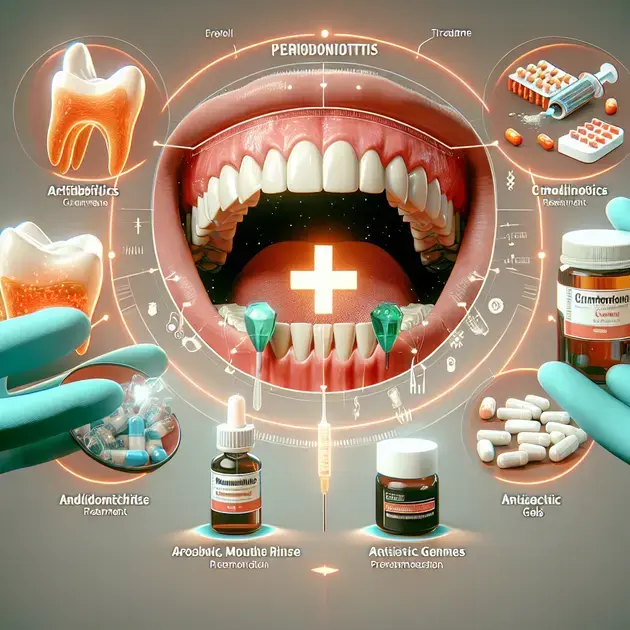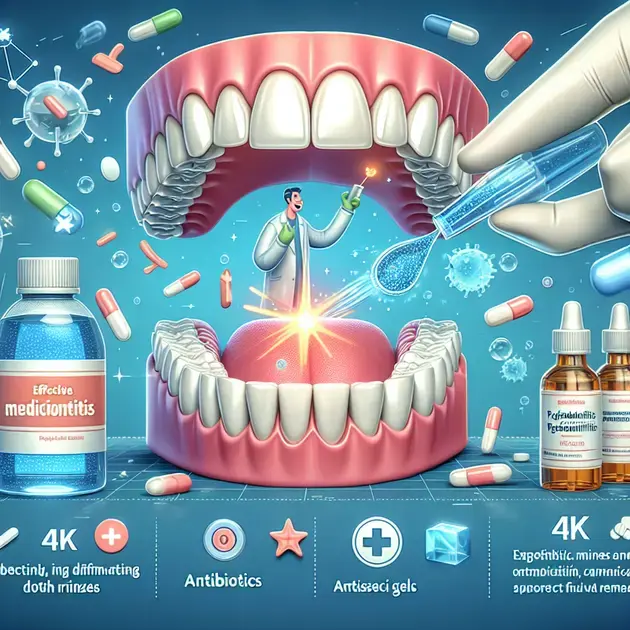Are you searching for an effective medication for periodontitis that can provide comprehensive treatment? Look no further, as this guide will walk you through the latest and most reliable options available in the market today. Periodontitis is a serious gum infection that damages soft tissue and destroys the bone that supports your teeth, but with the right medication, you can effectively manage and even reverse its effects.
From antibiotics to specialized mouth rinses, this comprehensive guide will explore a wide array of options to combat periodontitis effectively. With advancements in dental research constantly evolving, it’s crucial to stay informed about the most up-to-date medications and treatments to ensure optimal oral health. Let’s dive into the world of periodontitis medication and discover the best strategies for managing this common yet treatable condition.

Effective Medication Options for Periodontitis Treatment
Periodontitis is a serious gum infection that damages the soft tissue and destroys the bone that supports your teeth. It can lead to tooth loss if left untreated. In addition to practicing good oral hygiene, there are several effective medication options available for treating periodontitis.
Step-by-Step Guide:
1. Consult with a dental professional: The first step in exploring medication options for periodontitis is to schedule an appointment with a dentist or periodontist. They will assess the severity of your condition and recommend the most appropriate treatment plan.
2. Antibiotics: In some cases, antibiotics may be prescribed to help control bacterial infections associated with periodontitis. Common antibiotics used for this purpose include doxycycline and metronidazole.
3. Antiseptic mouthwash: Antiseptic mouthwashes containing chlorhexidine can help reduce bacteria in the mouth and promote healing of the gum tissue. These mouthwashes are often recommended as part of a comprehensive periodontal treatment plan.
4. Topical gels: Topical gels containing antibiotics or antimicrobial agents may be applied directly to the gum pockets affected by periodontitis. These gels can help reduce inflammation and promote gum healing.
5. Follow-up appointments: It is important to follow up with your dental professional regularly to monitor the progress of your treatment and make any necessary adjustments to your medication regimen.
Understanding Periodontitis: Causes and Symptoms
Periodontitis is typically caused by poor oral hygiene that allows bacteria to accumulate and form plaque on the teeth. If not removed through regular brushing and flossing, the plaque can harden into tartar, leading to inflammation of the gums and eventual gum recession. Understanding the causes and symptoms of periodontitis is essential for early detection and treatment.
Step-by-Step Guide:
1. Learn about the causes: Educate yourself on the risk factors that contribute to the development of periodontitis, such as smoking, diabetes, and genetic predisposition. By understanding these causes, you can take preventive measures to reduce your risk of developing the condition.
2. Recognize the symptoms: Common symptoms of periodontitis include swollen or bleeding gums, persistent bad breath, loose teeth, and gum recession. If you experience any of these symptoms, it is important to seek professional dental care for an accurate diagnosis.
3. Dental check-ups: Regular dental check-ups are crucial for detecting early signs of periodontitis and preventing its progression. Your dentist can perform a comprehensive examination of your oral health and recommend appropriate treatment options.
4. Dental hygiene routine: Establishing a consistent dental hygiene routine that includes brushing twice a day, flossing regularly, and using an antiseptic mouthwash can help prevent the development of periodontitis.
5. Professional cleanings: Schedule regular professional cleanings with a dental hygienist to remove plaque and tartar buildup that cannot be eliminated through regular brushing. These cleanings help maintain healthy gums and prevent periodontal disease.
Maximizing the Benefits of Periodontitis Medication
When prescribed medication for periodontitis, it is important to maximize the benefits of treatment to achieve optimal results. By following a few key strategies, you can enhance the effectiveness of periodontitis medication and promote better oral health outcomes.
Step-by-Step Guide:
1. Adhere to medication instructions: It is critical to follow your dental professional’s instructions for taking medication for periodontitis. This includes the correct dosage, frequency, and duration of treatment to ensure the medication’s effectiveness.
2. Maintain good oral hygiene: In addition to taking medication, practicing good oral hygiene habits is essential for managing periodontitis. Brushing, flossing, and using antiseptic mouthwash as recommended can help control bacterial growth and promote gum health.
3. Monitor progress: Keep track of any changes in your symptoms or gum health while taking medication for periodontitis. If you notice any concerning developments, consult with your dental professional for further evaluation and adjustments to your treatment plan.
4. Supportive therapies: In combination with medication, supportive therapies such as professional cleanings, scaling and root planing, and laser therapy can enhance the effectiveness of periodontitis treatment. Discuss these options with your dental provider to determine the best approach for your individual needs.
5. Lifestyle modifications: Making lifestyle changes such as quitting smoking, managing stress, and adopting a healthy diet can contribute to the success of periodontitis medication and overall oral health. Consult with your healthcare provider for guidance on incorporating these changes into your daily routine.

Effective Medication Options for Periodontitis Treatment Explained
When it comes to treating periodontitis, there are various effective medication options available that can aid in managing the condition. These medications are often prescribed by dentists or periodontists alongside other treatments such as deep cleanings and lifestyle changes. Understanding the different medication options and how they work is crucial for effectively combating periodontitis.
One common medication used for periodontitis is oral antibiotics. These antibiotics help to fight the bacterial infection that is causing the gum disease. They are usually prescribed for a specific duration and should be taken as directed by the healthcare provider to ensure optimal effectiveness.
Another medication option is antimicrobial mouth rinses. These mouth rinses contain specific ingredients that target bacteria in the mouth, helping to reduce plaque and prevent the progression of periodontitis. Using these mouth rinses as part of a daily oral hygiene routine can significantly improve gum health.
In some cases, dentists may also recommend the use of antiseptic chips or gels. These products are placed directly into the pockets between the teeth and gums where bacteria thrive. They slowly release medication to combat the infection and promote healing in the gums.
It’s essential to discuss with your healthcare provider the most suitable medication options for your specific case of periodontitis. They can provide personalized recommendations based on the severity of the condition and your overall oral health.
Understanding Periodontitis: Root Causes and Identification
Periodontitis is a severe gum infection that damages the soft tissue and destroys the bone that supports the teeth. It is mainly caused by poor oral hygiene that allows plaque to build up and harden into tartar. The bacteria in plaque can infect the gums and lead to inflammation, eventually causing periodontitis.
Identifying periodontitis early is crucial for effective treatment and preventing further damage. Common signs of periodontitis include red, swollen, or bleeding gums, persistent bad breath, and loose or shifting teeth. If you experience any of these symptoms, it’s essential to see a dentist promptly for a thorough examination.
Dentists can diagnose periodontitis through a comprehensive evaluation that may include measuring the depth of pockets between the teeth and gums, taking dental X-rays to assess bone loss, and examining the overall condition of the gums and teeth. This diagnosis helps determine the severity of the condition and the most appropriate treatment plan.
It’s important to note that certain risk factors such as smoking, diabetes, and genetic predisposition can increase the likelihood of developing periodontitis. By maintaining good oral hygiene practices, attending regular dental check-ups, and addressing risk factors, you can reduce the risk of periodontitis and promote overall oral health.
Maximizing the Benefits of Medication for Managing Periodontitis
Effectively managing periodontitis with medication requires a comprehensive approach that combines medication use with other treatment strategies. Alongside prescribed medications, maintaining excellent oral hygiene practices is essential for maximizing the benefits of medication and promoting gum health.
Consistent brushing and flossing help remove plaque and bacteria from the teeth and gums, reducing the risk of infection and inflammation. Using an antimicrobial mouth rinse as recommended by your healthcare provider can further enhance the effectiveness of medication in combating periodontitis.
In addition to at-home oral care, regular professional cleanings and check-ups are crucial for monitoring the progression of periodontitis and adjusting treatment as needed. Dentists may also recommend lifestyle changes such as quitting smoking, improving nutrition, and managing underlying health conditions to support the effectiveness of medication.
By following the prescribed medication regimen, maintaining optimal oral hygiene, and collaborating closely with your healthcare provider, you can maximize the benefits of medication for managing periodontitis and achieving improved gum health.
Conclusion
In conclusion, effective medication options play a crucial role in managing periodontitis by targeting the root cause of the condition – bacterial infection. Oral antibiotics, antimicrobial mouth rinses, and antiseptic chips or gels are valuable tools prescribed by healthcare providers to combat gum disease. Understanding how these medications work and following the prescribed regimen is essential for optimal effectiveness in treating periodontitis.
Moreover, recognizing the root causes and early signs of periodontitis is pivotal for timely intervention and preventing further damage to the gums and supporting bone structure. Poor oral hygiene leading to plaque buildup and bacterial infection is a primary culprit, emphasizing the importance of maintaining good oral health practices and seeking professional evaluation if symptoms like swollen gums or persistent bad breath arise.
To maximize the benefits of medication for managing periodontitis, a comprehensive approach is key. This involves a combination of prescribed medications, diligent oral hygiene routines including brushing, flossing, and antimicrobial mouth rinse use, and regular dental check-ups. Lifestyle modifications such as quitting smoking and addressing underlying health conditions further support the efficacy of medication in promoting gum health and overall well-being.



